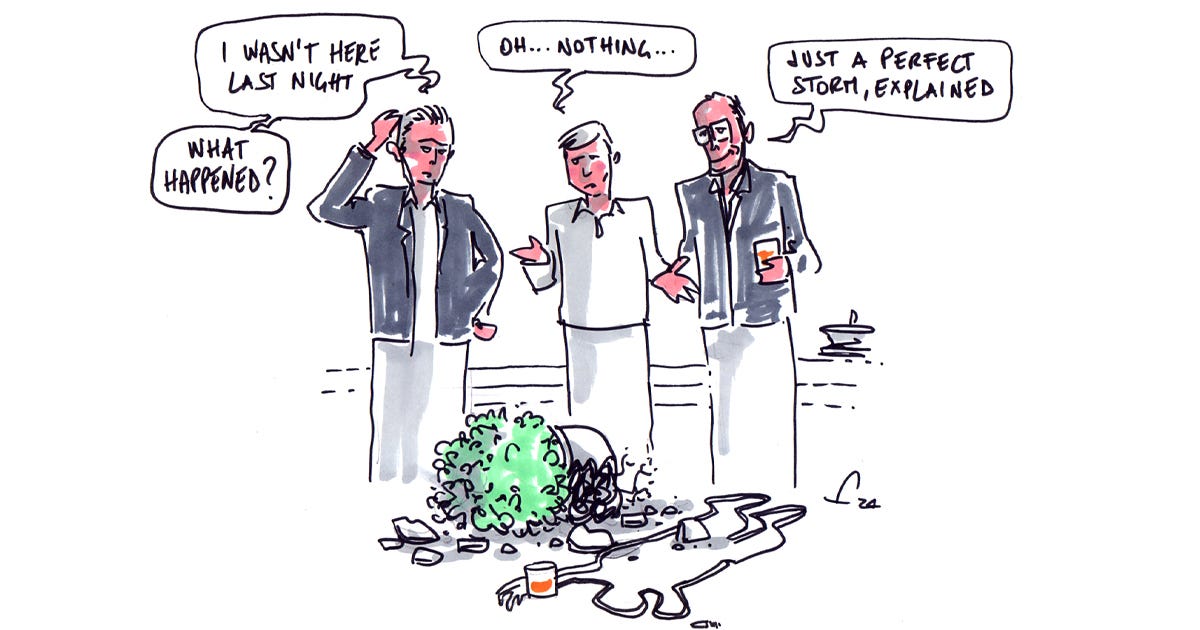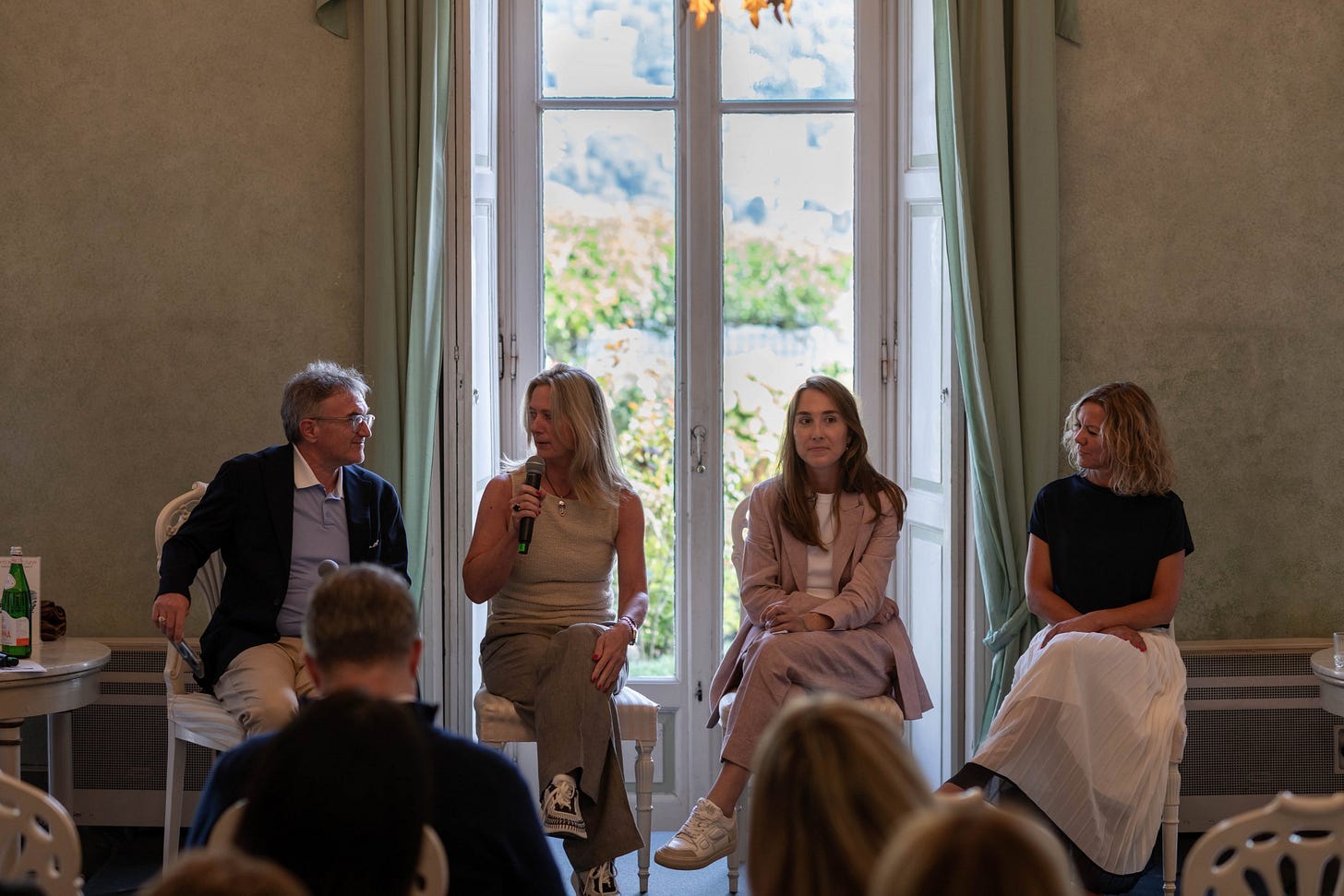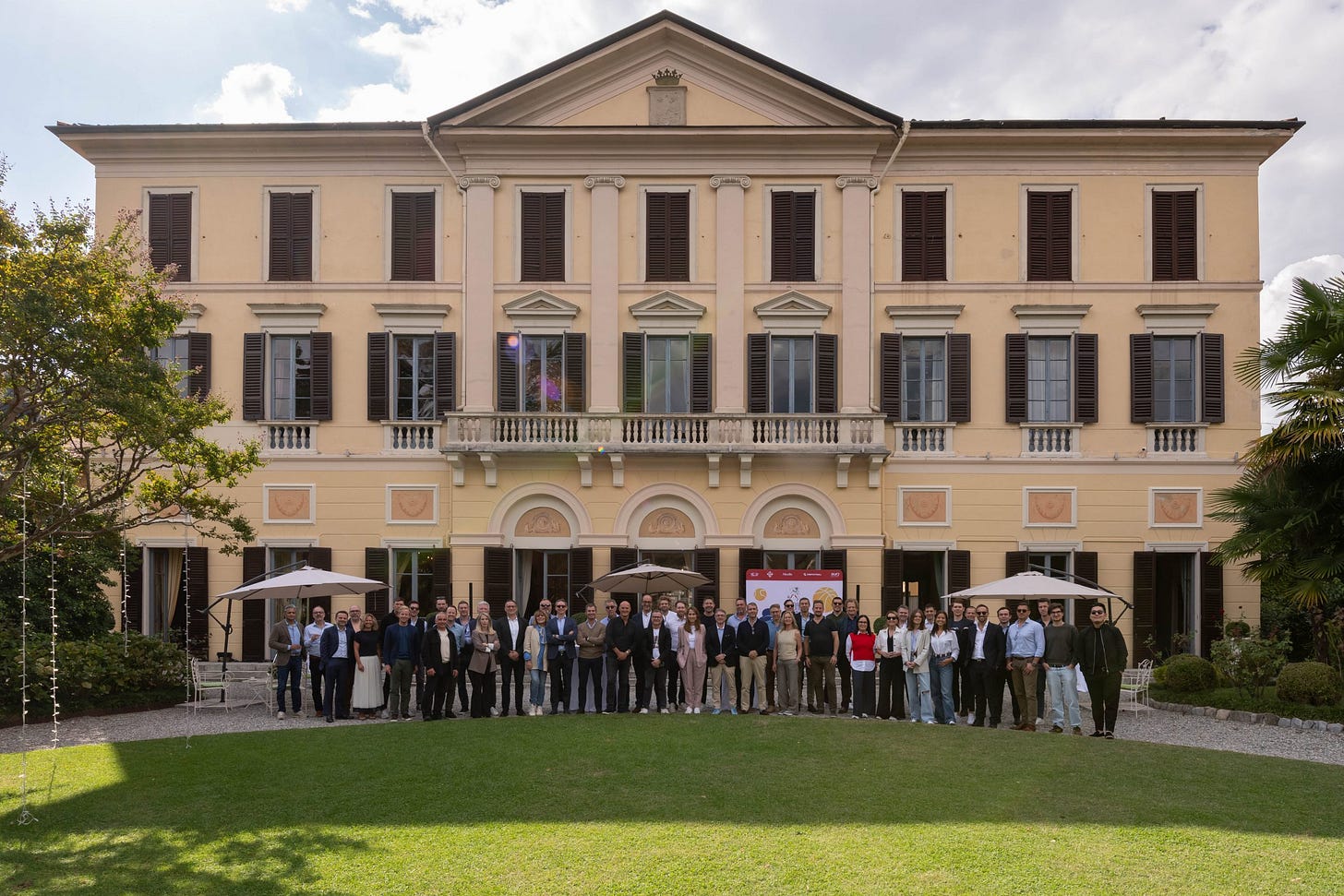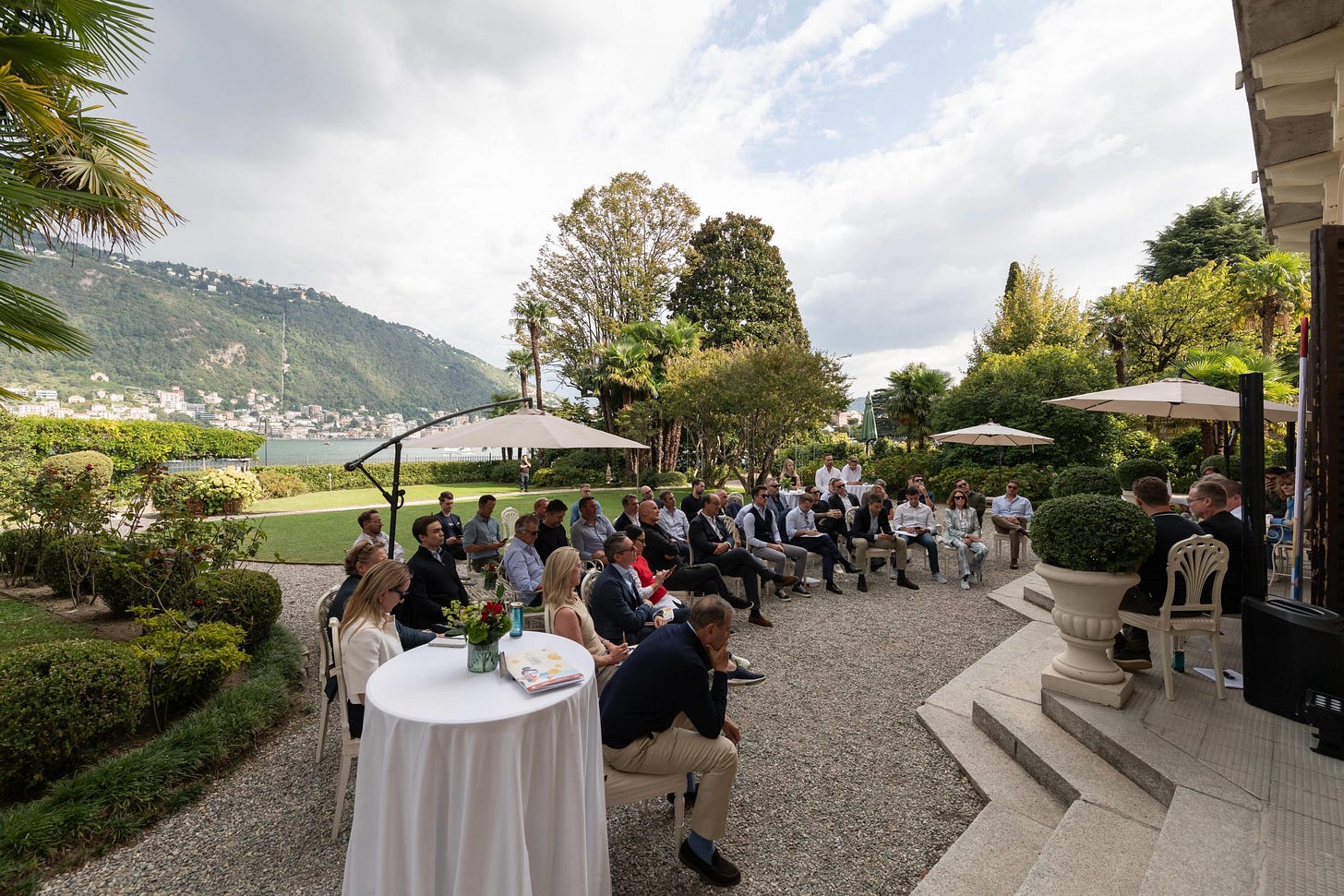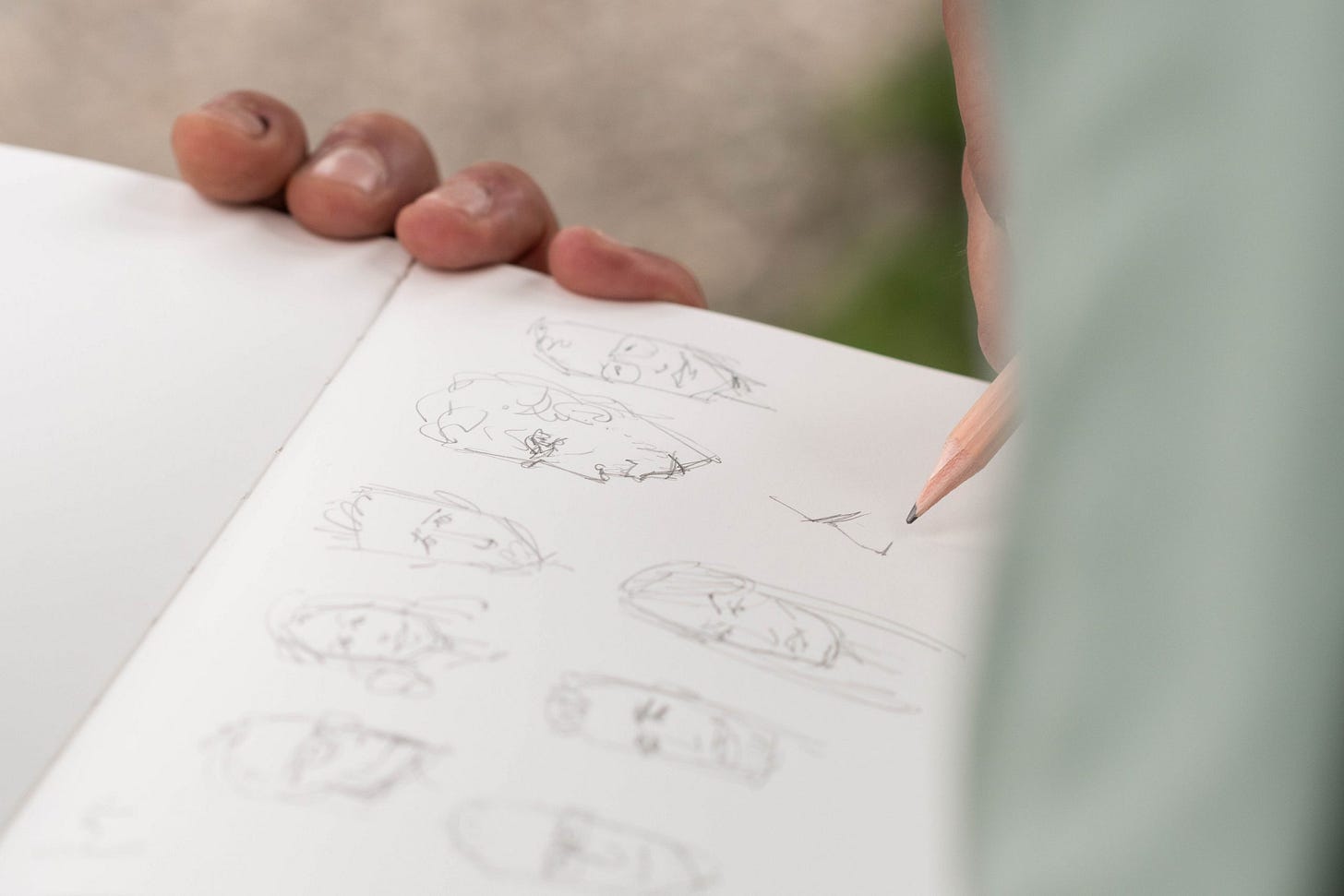A state of mind.
Como is a state of mind that makes the world and our sector seem a warmer place. It benefits from being physically distant from any of the big city hubs that have dominated this sector for 30 years.
The Albachiara Journal is an eclectic collection of our opinion and perspective, from our travels and encounters.
When Raffaella and I arrived in Como in 2006, our neighbour was a Venetian. If complimented on his amazing city, he always replied:
Venice is not a place, it is a state of mind. It cannot be described, only experienced.
And in the reflective days following this year’s “Sport Summit Como”, that, maybe, is the apposite description of last week.
The openness, authenticity and generosity in and around the summit every year is impossible to adequately explain to others. – Grant Williams
This may seem self-serving to observe, but this lake has a strange effect and that sentiment is all through the private messages we have received this last week. We have no monopoly on the best industry debates, no exclusivity on elite networking, no sole mandate on the big deals that take shape (here on the benches under the palm trees). Other conferences do exist.
But Como is a state of mind that makes the world and our sector seem a warmer place. It also benefits from being physically distant from any of the big city hubs that have dominated this sector for 30 years.
Mark Oliver is someone I’ve known for 25 years, with a world-class intellect that I first saw in action in 2000, in the political melodrama of everything leading up to the SPLTV project. He has advised on so many of the major transactions in sport and media in these decades, deservedly. So a quarter of a century later, reading his comment on the Summit as “the best sports summit there is. Thought provoking, independent, insightful, friendly, great location and run with passion and integrity” is a huge satisfaction for us all.
Passion and integrity, with an ear to the future.
Equally pleasing to see this week was the “connection” our lake event has with younger generations. We made a specific effort to open the SSC 2024 up to even more diversity of thought, by generation and gender. Not to pass any DEI hurdle of acceptability; but to freshen up the menu of our thinking with new points of view. Many this year commented on how valuable all these younger voices were, and everyone seemed to enjoy the “turnover” in faces.
People like, equestrian Olympian, Alexandra Thornton from Felix Capital. I saw her on a fundraising work call months ago and knew I wanted her to be here. Yannick Ramcke is another. He comes from One Football, who have sponsored this event since day 1. Three years ago, I shared the Albachiara vision for SSC over lunch with Elliot Richardson, and he sent a personal wire that very afternoon. On faith. It’s good to realise that this belief is being paid back.
New participants. New sponsors.
This is an industry that has been in an insular echo-chamber for far too long, dominated by the same old faces selling the same old playbook, and all of us could feel the extra positive vibe this year. The Roundtable on female sport did, as someone said, run over more than any other, and was superb.
5 years ago that panel would have been the one people excused themselves from, to take calls and network.
No longer. Indeed, in a similar vein, a recent Column on this topic was the widest read ever for this publication.
Women’s sport has a chance to “skip a technology” around formats, embrace new influencer drivers, without all the male angst of 150 years of baggage debating what is “tradition”. That is a huge opportunity, but I personally fear they won’t grasp it. Most here in Como disagreed.
The right sponsors are key to ignite the spark.
It was great to see Danny Townsend of Surj Sports Investment, feel comfortable, and contribute so much so openly. I’d like to think that in any other place in this industry he would have been ruthlessly targeted as the “mark with the big chequebook”, but I don’t think that happened here. It all seemed very normal for SURJ and Danny to be fully present in all sessions, despite currently juggling 4 deals that could transform our industry before this time next year. He had every excuse to be half-engaged. But he wasn’t.
Ramy Ibrahim from Moelis is another new sponsor, bringing his experience from the elite end of sport investment banking in New York. They have been advising some of the biggest deals in our sector, and he shared that insight freely, if very discretely. We heard from various invitees about how great they felt it was to have that kind of wisdom and firepower willing to engage with ideas so generously.
It is more than plausible here that a concept idea conversation at the gala dinner can leave the Como event already with a believable idea of funding and staffing. Como is very very interactive. Raffa and I don’t know the half of what is discussed in the margins, and that is how it should be.
Wait, what were you discussing? I’d like to see that.
Like this, some very profound things were said over the two days, under Chatham House Rules. We don’t have keynote speakers or what some call headliners. It’s all organic.
We have 50-ish equal members of a community.
The formal event is split across 5 roundtables. There are three top table speakers each time, where the role of the moderator is to facilitate full debate from the floor at the right moment.
Roundtable 1
A very raw discussion on what broadcasters could and would bid for in sport rights going forward. And in what shape? The realities of competitive auctions when you only have one bidder, if any. What would be the tactical response from rights holders? Did they have any more assets to sell?
Many in the room were left rather shaken. Zero punches pulled and it set the tone for the event.
Roundtable 2
A conversation about from where sport could make up the gap in revenues, if media really does hit a wall. The ARPU playbook, the price elasticity of ticketing in these tougher times, trying to capture part of the digital dollar from the web3/metaverse generations. Can sport ever politically invest risk capital in these long-term projects when player budgets dominate all? Representatives from leagues and clubs told us the political reality.
Roundtable 3
In my humble opinion, the best debate on women’s sport you will ever hear. Revenue models, product definition and formats, culture sensitivities. Should women’s football mess around with a format of 90 minutes? Why does it need to be hooked to that idea, when we know younger and new audiences have diminishing interest. Bo Han from the floor most interesting.
Is the game, the idea of winning, the format, even that important? Are women’s franchises simply fashion brand plays? And soap opera content? To be clear, this was all a very minority report opinion. 😉
Thanks to Caroline, Mia and Alex. And Mercury13.
Roundtable 4
Where the rubber hits the road. The intersection of sport and finance, but debated by people already investing, and with the scars. What has worked and what hasn’t. Mark-to-market realities. How providers of capital now view the opportunity to invest in sport. How they manage, and mitigate, risk.
This discussion took place in the garden, as we all took our seats out into the late afternoon September sun.
Sam from the PTO, Markus from Sixth Street and Danny. Ares, Santander, Julius Baer, Oakvaleand of course Moelis opining from their seats under the umbrellas.
These are all the people doing actual deals, as opposed to critiquing them from afar with no experience.
Roundtable 5
The natural follow-on from the previous four, this discussion tasked itself with describing what our industry will look like in 2030 with all these variables. Elliot Richardson, for example, teased out a staggering analysis of the English Premier League scenarios in the context of the Man Citylegal case, the chess moves of Nasser and the ECA, and the next tender strategy. From the floor, a potential rugby union superleague project was thrown around (based on a previous public Column I did) with the strap-line “half the games, double the remuneration”. This industry is killing its stars with too many games.
With SURJ in the room, and Mia from ProCycling, the ATP, the PTO, Furlani from AC Milan, you just had to be there to digest fully the energy of transformation, and what we are going to see in the next six years. Hold onto your hats.
Our “Book of Brilliant Things“.
The morning of the second day finished with the Simple Minds inspired breakout sessions, where we were all asked to list out and debate our reasons to be cheerful for this glorious industry.
It was just superb to see the 5 groups of 10 in action, so eclectically different in participant, relaxed in thought and discussion, as another seaplane buzzed in to land.
This session will be translated into some form of graphic novel by our extraordinary artist, Jacopo Ziliotto, and will show how special this product of sport is.
So what is brilliant about sport?
To continue reading this article, and discover what is brilliant about sport, please click here.
Embark on a gripping journey through the intertwined worlds of sports, media, and finance in "Sport's Perfect Storm."
Authored by Roger Mitchell, this illuminating book unveils the challenges these industries face amidst a hurricane of change. Learn how to navigate the turbulent seas of uncertainty, ensuring not just survival but sustainable success.
This book is recommended reading for those starting out, as well as also being a serious manual for experienced corporate finance people, especially those looking to invest in sport.
To secure your Limited Edition copy now, unveil hidden risks, and sail towards a future of informed decision-making, click below 👇


